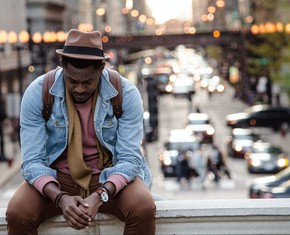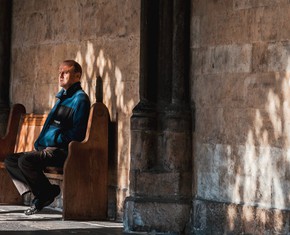The views expressed in our content reflect individual perspectives and do not represent the authoritative views of the Baha'i Faith.
Every year Baha’is fast for 19 days, going without food or drink during the daylight hours. I’m a kill-two-birds-with-one stone type of person, so last year I added something new to my Baha’i Fast.
A year ago, I wrote an article about my attempts to achieve more than one objective by combining intermittent fasting with the Baha’i Fast, which meant that essentially I only ate at night, though still drinking in the morning before sunrise.
RELATED: Want to Fast Along with the Baha’is? Here’s How
At the time it seemed like a good idea. If I could reap the spiritual rewards as well as some physical benefits, then why not?
According to Baha’u’llah, “There are various stages and stations for the Fast and innumerable effects and benefits are concealed therein. Well is it with those who have attained unto them.”
Abdul-Baha also said “Fasting is the cause of the elevation of one’s spiritual station.”
Numerous health studies have shown the physical benefits of intermittent fasting as well. So, I reasoned, couldn’t I have my cake and eat it too (after sundown)?
It’s now a year later, and I’ve since ditched intermittent fasting altogether. On a normal day, outside the Baha’i fasting period, I have tried countless times to maintain a 16/8 diet, which means not eating anything until around noon. But I realized it just doesn’t suit my body type. I’m a lean, mean eating machine. I need to eat as often as possible, or I feel faint and frustrated.
Nonetheless, this year again I attempted to combine the Baha’i Fast with the 16/8 diet, and I paid the price. I was incredibly tired, lethargic, anxious and agitated, not to mention, deeply depressed. I thought there was something wrong with my body. One reason that I stopped eating breakfast during the Fast was that eating so early made me feel nauseous. But I decided I had to try and eat in the morning. So, I did. Instead of the big, cooked meal I used to try to force down, I just ate a simple breakfast containing carbs, protein and fat. The result? I still got hungry two hours later and had the same hunger levels as I would without eating breakfast – but I had a lot more energy, felt stronger and less anxious.
This helped me see that I had overlooked an important caution from Baha’u’llah, that any rigorous regime such as fasting should adhere to the laws of God, not our own delusions. If we trust that the messengers of God possess profound wisdom, then we can follow their guidance without overthinking things. In trying to combine two disparate goals, I had overcomplicated my Fast and turned it into more of a test of endurance than it needed to be.
Moreover, instead of simply following Baha’u’llah’s guidance, I had created my own.
This experience has also helped me realize that sometimes we need to focus on just one thing at a time. (Yes, I have done a full circle!) The main difference between the Baha’i Fast and other forms of fasting such as the 16/8 diet is in their purpose. The chief aim of the Baha’i Fast is spiritual, whereas these other forms of fasting focus on the physical. Baha’i fasting may improve the health of your body, but that’s not the point – that’s not its objective. The aim of the Baha’i Fast is to draw closer to God through detachment and purification of the self.
That said, we can’t ignore the body either. The body is the vessel of the soul, so by taking care of that vessel we also respect and nurture the soul. That’s the reason for eating a healthy breakfast and dinner during the Baha’i Fast. I’ve learned that I don’t need to obsess about eating an absolutely perfectly healthy diet, but I do need to ensure I’m getting enough energy and nutrition to sustain me through the day. Funnily enough, I was doing the opposite: obsessing about the health of my body by eating less than I should have. This taught me that there needs to be a balance.
RELATED: How I’m Finding Ways to Fast Mindfully
I’m not saying that everyone doing the Baha’i Fast has to eat breakfast. I know people who do fine during the Fast on dinner alone, but they have a different body type and psychological make up than I do. I’m also not saying that we can never accomplish two things at once. I do it all the time. I take food scraps to the communal compost bins on the way to the supermarket: two birds, one stone! But that’s a simple task. With bigger things, sometimes the added-on aims can overshadow the main aim and diminish the result.
A couple of months ago, I thought I would be a good husband and buy my wife some sweets at a bakery. I went home and handed her the paper bag of yumminess with a proud smile on my face only to see her face contort with disgust as she bit into a chocolate tart. “I think they baked the sweet pastries with the savory ones,” my wife said. Along with chocolate and vanilla she could taste onion and herbs. Clearly the baker had been trying to kill two birds with one stone, but one flew away and pecked my wife!
















Comments
Sign in or create an account
Continue with Googleor